Workshop 1: Effective and efficient nursing communication – How to succeed? – Marlene Sator, PhD
Effective and efficient communication with patients is a core nursing competence, which improves nursing outcomes and patient as well as nurse satisfaction.
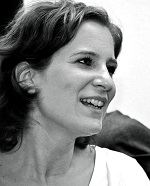
Marlene Sator, PhD MEACH-International Association for Communication in Healthcare, Vienna, Austria
Especially for international nurses, who have to work in a language, which is not their mother tongue, good communication can be quite challenging in difficult working conditions. But: In particular because daily working conditions are often challenging e.g. in terms of workload and time pressure, good communication skills are especially important. And: We know that effective and efficient communication can be learned.Participants of this workshop will gain a greater understanding of the effects of good communication, they will become acquainted with some key communication skills and apply them in short exercises. Furthermore, participants will be motivated to reflect on their own communication and its effects and to delve into this key nursing competence in further workshops.
Workshop 2: Role and tasks of an integration commissioner. Developing a workplace-curriculum for an integration commissioner in hospitals – Katalin Bordi
To achieve successful integration of employees from abroad, it is required to build up the necessary structures and to take into consideration the organizational framework conditions.
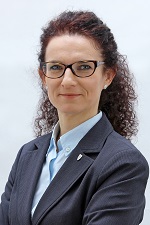
Katalin Bordi Agaplesion Frankfurter Diakonie Klinken, Frankfurt, Germany
The international nurses need special care and support during the initial phase upon their arrival as well as during the first year. For this purpose, AGAPLESION provides the so-called integration commissioner (mentors, guides) within their facilities. One of the tasks of the integration advisers is to maintain contact with the applicants during the acquisition phase and to control the application process. They also organize the arrival of the new colleagues, accompany them in the course of administrative procedures and support them in the issues they face during the start-up period.
The ideas and expectations of the international specialists, the local colleagues and executives often differ. The integration commissioner acts as a link between the new employees, the management, other leader and the various (different?) administrative areas. They administer (accompany) the feedback discussions between the employee and the management, whereby many potential conflicts and difficulties can be identified and resolved at an early stage.
The participants in the workshop discuss the role and tasks of the integration commissioners, and as a result, they define their job description.
Workshop 3: Intercultural competencies, strategies and tips in nursing – Kris van de Poel, Prof. Dr. Dieter Vermadere
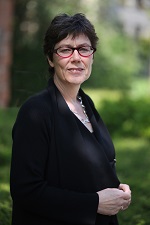
Kris van de Poel University of Antwerp, Belgium
Healthcare communication is, at best, a delicate balancing act. When healthcare professionals and patients come from different language and cultural backgrounds and do not share the same beliefs, ideas and convictions this is even more so. In this hands-on workshop participants will first identify the main challenges in intercultural communication relying on their own experiences.
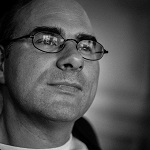
Prof. Dr. Dieter Vermandere University of Antwerp, Belgium
Materials and examples from Nursing on the Move will be the starting point for a collaborative exploration of strategies and tips which can be used to feed professionals’ intercultural competencies. We will round off this workshop with a vote on intercultural do’s and dont’s and compare them with data from a 2016 study of Austrian nurses.
Workshop 4: Scenarios for teaching and learning with „Nursing on the Move“ – Marilize Pretorius, Elke Ruelens, Christine Fourie
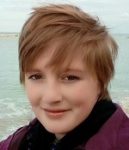
Elke Ruelens University of Antwerp, Belgium
Online learning presents a number of challenges to both learners and teachers when compared to the learning process as it takes place in a traditional language and communication classroom. However, such problems can be resolved in various ways. In this hands-on, collaborative workshop participants will first identify the different types of challenges from different perspectives and on the basis of materials and examples from Nursing on the Move.
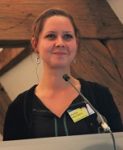
Marlizie Pretorius University of Antwerp, Belgium
We will then explore a wide range of tools, strategies, methods and approaches that can be used creatively and purposefully to offer learners and trainers support in online professional language learning. We will round off this workshop with the ten golden rules for how to work with NoM drawn up by participants in the NoM communication training programme in Italy in the Spring of 2017 and compare findings.
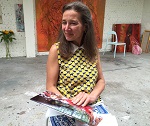
Chrtistine Fourie University of Antwerp, Belgium
Workshop 5: Testing nursing commnication skills – Tobie van Dyk
For more information please click here.
Interesting websites
• Strategie zur Verbesserung der Gesprächsqualität in der Krankenversorgung (German website)
• Österreichische Plattform Gesundheitskompetenz (German website)
• EACH: International Association for Communication in Healthcare
• Empathy: The Human Connection to Patient Care
• What is Teach-back?
• Agaplesion – International Applications
• Bundesamt für Migration und Flüchtlinge (German website)
• Make it in Germany
• Network Integration through Qualification
• Health Care Communication in Intercultural Settings, part 1 of 4 click
• Health Care Communication in Intercultural Settings, part 2 of 4 click
• Health Care Communication in Intercultural Settings, part 3 of 4 click
About the authors
Marlene Sator, PhD:
Marlene Sator, PhD, is a linguist with a special focus on healthcare communication, professional communication trainer and psychotherapist in training under supervision. She was a researcher at the Center for Interdisciplinary Research at Bielefeld University (Germany), at the University of Vienna in cooperation with Vienna General Hospital and at Heidelberg University Hospital (Germany).
Currently, she is the national representative of Austria for EACH (European Association for Communication in Healthcare). Since 2014, Marlene Sator has been working at the Austrian Public Health Institute, Department of Health and Society, with a focus on developing and implementing a national policy for improving healthcare communication in Austria.
Katalin Bordi:
Katalin Bordi, born in Transylvania / Romania, studied nursing and worked in Romania, then in Hungary and most recently in Germany. She has studied business administration at the J. W. Goethe University in Frankfurt am Main and Healthcare Management in Kassel.
She is working as advisor for international recruiting and personnel development at AGAPLESION gAG for seven years. Her responsibilities include the coordination of the AGAPLESION projects within the framework of the acquisition and integration of specialists from abroad and cooperation with universities abroad.
Kris van de Poel:
Kris van de Poel is an applied linguist engaging in teaching and research in applied linguistics. She has coordinated and audited projects in the UK, Scandinavia, Eastern and Central Europe, Asia and Africa. She is a professor at the University of Antwerp (Belgium) and an extraordinary professor at North-West University in South Africa.
With a keen interest in communication challenges in professional and academic contexts, her research is applied and data-driven and firmly embedded in Language for Specific Purposes. Currently she is working on professional acculturation and intercultural communication.
Prof. Dr. Dieter Vermandere:
Prof. Dr. Dieter Vermandere teaches Italian sociolinguistics, General Linguistics, Language Management and Intercultural communication at the University of Antwerp (Belgium). His research focuses on sociolinguistic variation, Italian dialectology and language management in multilingual settings.
Marilize Pretorius:
Marilize Pretorius is an academic literacy lecturer at the University of the Free State, South Africa and teaching nursing language and communication skills for the pilot of Nursing on the Move.
Her current research pertains to language and communication training for nursing professionals: how to remain patient-centred by bridging communication gaps caused by language discordance.
Elke Roulens:
Elke Ruelens is a PhD Researcher at the University of Antwerp (Belgium) and language teacher, involved in the Antwerp pilot of Nursing on the Move as trainer.
Her research specialisation is centred on how to foster Learner Autonomy in language and communication training.
Christine Fourie:
Christine Fourie is a lecturer in academic literacy for Nature&Sciences as well as Law students at the University of Stellenbosch. Medical communication training for first year medical students at the University of Stellenbosch, South Africa.
Researcher on online learning behaviour and blended learning environments.
Tobie van Dyk:
His expertise is in the fields of language testing and language for specific purposes, particularly language for academic purposes and language for occupational purposes.

Citation:
Sator, Martlene/ Bordi, Katalin/ Van de Poel, Kris/ Vermandere, Dieter/ Pretorius, Marilize/ Roulens, Elke/ Fourie, Christine/ Van Dyk, Tobie: Health Care Communication in Intercultural Settings – From Challenge to Success (Part 4 of 4) (In: Polak, G. [ed.]: GI-Mail 07, ISSN: 2312-0827 Going International, Vienna 2017)
Here you can download this publication.
Published in GI-Mail 07/2017 (English edition).
- Do you already know our monthly newsletter GI-Mail with useful tips on postgraduate courses?
Sign up here. - Are you looking for vacancies or new career challenges? Here you will find the latest vacancies and job offers.
- Are you interested in up to date postgraduate courses and CME? In our education database »medicine & health« you will find new education events from over 2300 organizers.
